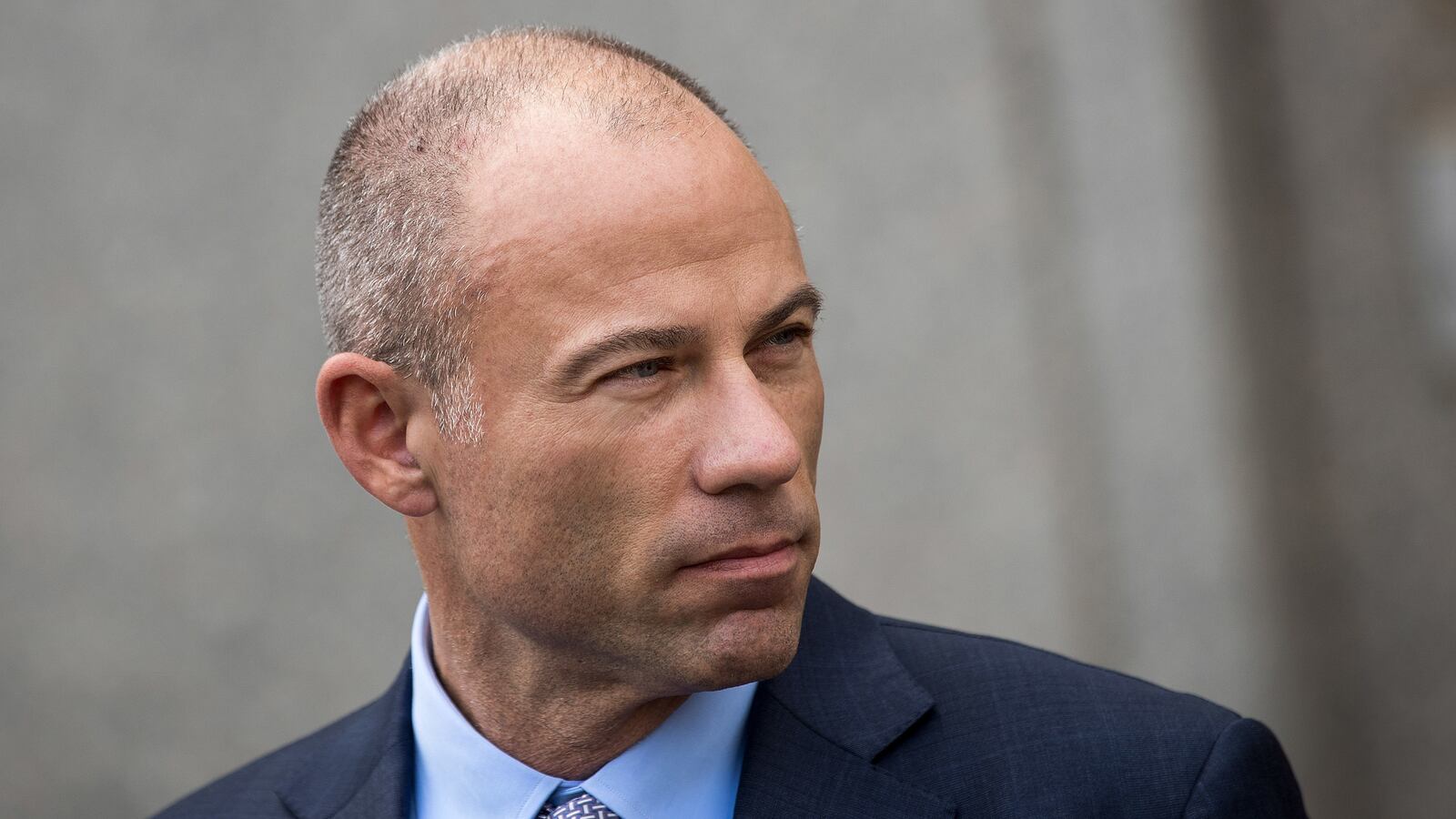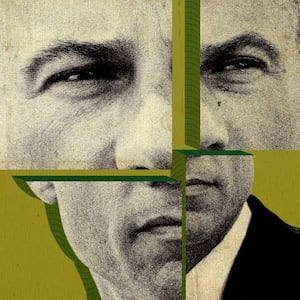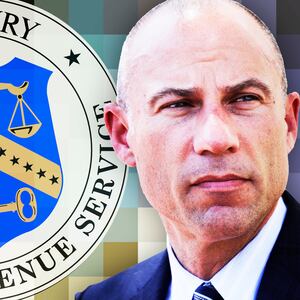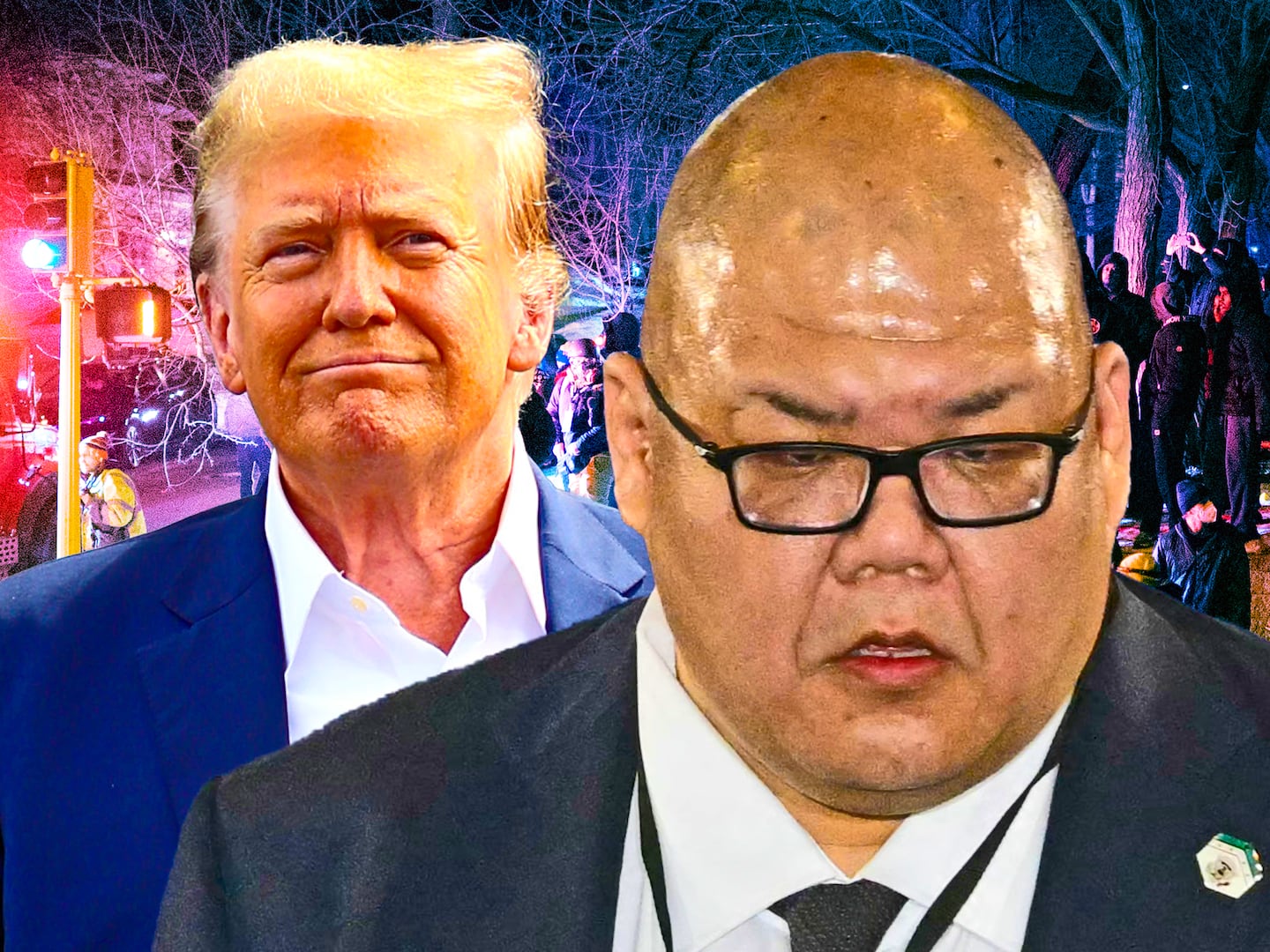Lawyer Michael Avenatti was hit with a one-two punch of federal charges on Monday: an allegation in New York that he tried to extort Nike for up to $25 million and an accusation in California that he misappropriated a client’s settlement money.
“The case paints an ugly picture of lawless conduct and greed,” Nick Hanna, the U.S. attorney in Los Angeles, said at a news conference to announce wire fraud and bank fraud charges that could land Avenatti in prison for up to 50 years.
Minutes later, on the opposite coast, Manhattan U.S. Attorney Geoffrey Berman told reporters that Avenatti had “used legal and extortionate threats with the purpose of obtaining millions of dollars in payments for himself”—an old-fashioned shakedown.
Avenatti, best known for representing porn star Stormy Daniels in her fight against President Trump, was allegedly teamed up with another lawyer, identified by the Wall Street Journal as celebrity attorney Mark Geragos, who immediately lost his gig as a talking head on CNN.
The case in California was built on reams of financial records and a complaint from the client whose settlement was allegedly diverted, according to court papers.
In New York, prosecutors had help from from Nike attorneys, who who worked for mega-lawyer David Boies’ firm, according to the Wall Street Journal, and apparently captured Avenatti’s threats on tape.
“I’ll go take ten billion dollars off your client’s market cap,” Avenatti told Nike’s legal team, according to the criminal complaint.
“I’m not fucking around.”
Monday morning, Avenatti tweeted that he was planning an 11 a.m. press conference on Tuesday “to disclose a major high school/college basketball scandal perpetrated by Nike.”
Soon after, prosecutors announced he was under arrest and charged in two jurisdictions. Taken into custody at the Nike lawyers’ office, Avenatti later appeared in a Manhattan courtroom, where a judge ordered him released on $300,000 bond.
Outside the courthouse he professed his innocence. “I am highly confident that when all the evidence is laid bare in connection with these cases, when it is all known, when due process occurs, that I will be fully exonerated and justice will be done,” he told reporters.
The bombshell announcements mark a stunning fall for Avenatti, who shot to fame by representing porn star Stormy Daniels in her hush-money lawsuit against President Donald Trump, toyed with the idea of running in 2020, and glommed onto a host of other high-profile legal matters.
In recent months, however, he’s been surrounded by turmoil: a girlfriend accused him of domestic violence; he was mired in a nasty divorce case and bankruptcy proceedings that yielded allegations of financial chicanery; and Daniels dumped him as her attorney.
In a statement posted to her Twitter account on Monday afternoon, Daniels said she was “saddened but not shocked” by the criminal charges against her former counsel and claimed, without elaboration, that Avenatti had been dishonest in his dealings with her.
According to the New York criminal complaint, Avenatti conspired to extort Nike by threatening to damage the company’s reputation if it didn’t agree to make multimillion-dollar payments to Avenatti and the alleged co-conspirator identified in the documents as “an attorney licensed to practice in the state of California, and similarly known for representation of celebrity and public figure clients.”
FBI Special Agent Christopher Harper said in an affidavit that the other lawyer contacted Nike on March 13 and asked for a meeting on a “sensitive matter.”
He and Avenatti then met two outside lawyers for Nike—who worked for mega-lawyer David Boies firm, according to the Wall Street Journal—at their New York office, along with Nike’s in-house attorney.
During the meeting, Avenatti said he represented an Amateur Athletic Union coach whose team had a contract with Nike that the shoe brand had decided not to renew.
Avenatti said his client had evidence that Nike employees had authorized and funded payments to the families of at least three top high-school basketball players and their families and were trying to conceal the payouts, the complaint said.
According to the complaint, Avenatti told Nike’s counsel “that he had approached Nike now because he knew that the annual NCAA tournament —an event of significance to Nike and its brand—was about to begin and further because he was aware that Nike’s quarterly earnings call was scheduled for March 21, 2019, thus maximizing the potential financial and reputational damage his press conference could cause to Nike.”
Avenatti allegedly offered to cancel the press conference if Nike made a $1.5 million payment to his client and “retained” him and his co-counsel at a cost of $15 million to $25 million to conduct an “internal investigation,” prosecutors say.
If Nike didn’t want to “retain” the pair, the company could pay $22.5 million to “resolve any claims” the client might have—and ensure Avenatti’s silence, court papers allege.
At the end of the meeting, Nike’s representatives went to prosecutors and arranged to record calls in which Avenatti laid out his demands.
“I’m not fucking around with this, and I’m not continuing to play games,” Avenatti said in the call, according to investigators.
“You guys know enough now to know you’ve got a serious problem. And it’s worth more in exposure to me to just blow the lid on this thing,” Avenatti allegedly warned. “A few million dollars doesn’t move the needle for me.”
Avenatti agreed to meet with Nike’s outside attorney in person on March 21—in a conversation that would be recorded on video, under the direction of law enforcement, by two of Nike’s counsel.
Nike’s attorney told Avenatti that he’d never received a $12-million retainer from Nike or done an investigation for the company “that breaks $10 million,” prosecutors say.
In response, Avenatti asked whether the attorney has ever “held the balls of the client in your hand where you could take five or six billion dollars market cap off of them?”
The attorney, at the direction of investigators, said he didn’t think the $1.5-million to Avenatti’s client would be a “stumbling block” but asked if he could still cancel the press conference without the retainer demand.
The attorney asked if Nike could just pay Avenatti’s client to get rid of the problem, rather than retaining Avenatti and his co-conspirator.
Avenatti replied that he didn’t think it made sense for Nike to pay his client an “exorbitant sum of money… in light of his role in this,” court papers allege.
Avenatti and his accomplice left the room to discuss. When they returned, Avenatti allegedly offered a confidential settlement to Nike worth $22.5 million.
“Full confidentiality, we ride off into the sunset,” Avenatti said.
Avenatti then spelled out the trouble Nike could face if he went public with his claims, saying, “As soon as this becomes public, I am going to receive calls from all over the country from parents and coaches and friends and all kinds of people—this is always what happens—and they are all going to say I’ve got an email or text message…”
Avenatti added that “90 percent of that is going to be bullshit… whether it’s R. Kelly or Trump, the list goes on and on—but 10 percent of it is actually going to be true.”
“And every time we get more information, that’s going to be the Washington Post, The New York Times, EPSN, a press conference, and the company will die—not die, but they are going to incur cut after cut after cut…” Avenatti continued.
On Monday, Avenatti and his alleged accomplice agreed to meet at the Nike attorney’s office, and Avenatti made clear it was the company’s last chance to play ball.
Two hours after that video-recorded meeting, Avenatti posted a cryptic message on Twitter, linking to a story about a college basketball corruption trial.
“Something tells me that we have not reached the end of this scandal,” Avenatti wrote. “It is likely far far broader than imagined.”
While the New York case developed over the course of two weeks, the California case was two years in the making—prompted by a tip from an IRS collection officer.
He is charged with wire fraud for allegedly swiping settlement money from one of his clients, and using it to bail out his coffee business.
Prosecutors said the client was due $1.6 million by Jan. 10, 2018, but Avenatti dummied up a bogus agreement with a later payment date, then wired the money to his own account and used it for his own purposes. He even gave the client an advance of $130,000 to tide him over.
“In essence, it appears Michael Avenatti loaned the client’s own money to his client. To this day, the client is waiting on the bulk of his settlement,” Hanna, the U.S. attorney, said.
Avenatti also faces bank fraud charges for allegedly lying on three separate bank loan applications totaling $4.1 million dollars; he claimed an annual income of $4 million to $5 million and tax payments of $2.5 million in years in which he paid no taxes, prosecutors said.
“This conference is about an attorney who used his client’s money to pay for his lavish lifestyle,” that included a car racing company, beachfront homes, and $200,000 a month in expenses, said Mark Pearson of the IRS.
Avenatti was expected to appear in court in Manhattan later on Monday. It was not clear if he has an attorney.








